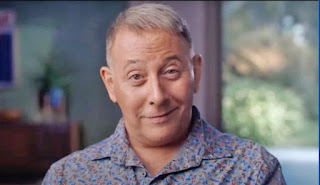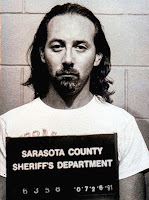On the subject of the current Pee-Wee Herman doc on HBO and its streaming platform (neither of which I subscribe to), there’s a documentary (The Humiliated, 1998) about the making of Lars von Trier’s The Idiots, where the director asked to interview von Trier, who said no, definitely not. Then Lars presented the director with a “diary”-like narration that he thought the director would want. When the director had fitted his making-of film around the narration, he realized that Lars had, indeed, controlled his documentary and changed the way it was shaped and structured.
That’s exactly what Paul Reubens did to his docu-biographer Matt Wolf in the current HBO offering, Pee-Wee as Himself. Reubens did consent to interviews but then proceeded to badger Wolf about how he’d handle different topics and asking why it was exactly that he (Reubens) couldn’t direct his own life story.
Of course by doing this Reubens *was* co-directing the film and making sure that it went in certain directions. (He was also hiding a cancer battle he was going through, so he most likely thought he couldn’t work on the completion of the film, which drove the perfectionist in him totally nuts.)
The film’s title was carefully chosen. The other result is that we see Reubens for the very first time speaking at length about his life and the Pee-Wee Herman character. In fact, the more we see of the real Paul Reubens, especially when he’s badgering Wolf, the more we see that Pee-Wee was an extension of his own personality:
 |
| Making the filmmaker his straight man. [in a manner of speaking] |
All in all, it’s a fascinating look at a man who did indeed hide himself completely behind his character, until the first of two life-changing arrests went down.
 |
| A rarely seen view of the Playhouse set. |
I was fresh out of school when “Pee-Wee’s Playhouse” began its run (thus, an actual adult), but by then I was already sold on Reubens’ character, thanks to Pee-Wee's Big Adventure and his appearances on television. Thus, I came to the Wolf documentary with vivid memories of Paul/Pee-Wee at his most famous and then at his most infamous.
That last becomes an issue in the doc, as we get to see various entertainers (Sam Kinison, Soupy Sales, former collaborator Phil Hartman) condemning Reubens for the porn-theater masturbation arrest. Although that arrest did put the damper on doing the Pee-Wee character (until a 2010 Broadway run of the original Groundlings-era show and a 2016 final Pee-Wee film on Netflix), it did not squash the ardor of his diehard followers, who liked him more when they found out he had some normal, everyday traits, like horniness. Thus, those condemning Reubens (incl. the former “dirty” and then pious [and always-drab] Howard Stern) wound up looking like narrow-minded scolds.
Filling in the gaps: Who was Paul Reubens? What was Wolf able to get from Reubens, even at the height of Herman-hectoring that Reubens put him through? A full portrait of his life from childhood through his 30s. It’s the first time Reubens openly addressed his life as a gay man at any length, going so far as to talk about the one deeply committed relationship he had with another man (an artist named Guy) and how he broke it up so he could further concentrate on his career.
 |
| P.R. in drag. |
 |
| As Native American lounge singer "Jay Longtoe." |
The doc also addresses the fact that he discarded some other people on his rise to the top (including the manager who got him the movie deal for Big Adventure, thereby making Pee-Wee pretty much a household name). Thus, Reubens was okay with airing some of his dirty laundry. Wolf additionally adds in (via the Stern interview with Phil Hartman) one of the most persistent rumors about the Pee-Wee character — that Reubens developed the character and the Playhouse concept initially with several other members of the Groundlings and then used their contributions on the “Playhouse” TV series without giving them credit.
His proudest moment.
Of all the reflections on his work, it seems particularly interesting that Reubens prized above many other big moments his being able to create and air a prime-time Christmas special set in the Playhouse. Although Reubens was committed to never “breaking the bit” in the ’80s, he recruited numerous gay/camp icons to be on the Xmas special.
 |
| Grace Jones on a prime time Xmas special. |
The mug shot and the arrests
It’s most interesting that the only time that Reubens drops out of the “narration” of the doc is when the chronology reaches his two arrests. According to intertitles, he never “completed” those interviews, but it appears like he said nothing about them, or Wolf chose not to use anything he might have said about them.
Going back to the idea that Reubens can be said to the “co-director” of the film by guiding Wolf along certain pathways, it is most interesting (and definitely the saddest moment in the film) when we hear a final audio recording of Reubens (sounding much, much older and obviously far sicker) talking about how he did not want the label of pedophile to be part of his legacy. (He was cleared of the charge, legally — his lawyers had him take a plea for possession of a lot of porn, which is hardly a crime, but it was something to get the enterprising DA of L.A. off his back.)
 |
| An early mugshot found online. (This arrest not mentioned in the doc.) |
 |
| One very tiny corner of the collection. |




